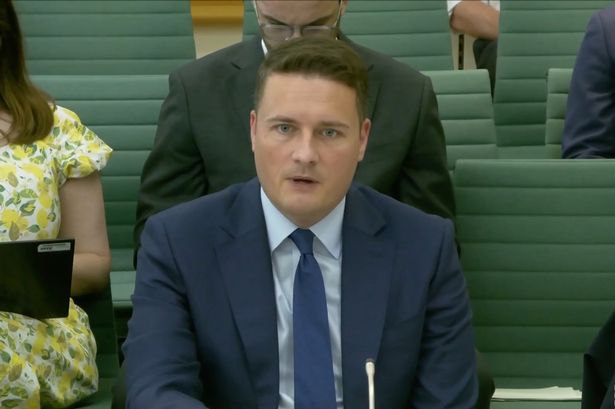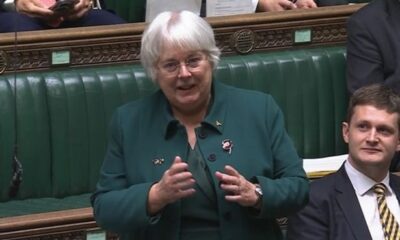Politics
Wes Streeting Defends NHS Dentistry Funding Amid Criticism

Health Secretary Wes Streeting faced intense questioning from Members of Parliament (MPs) regarding the Labour government’s decision to maintain the National Health Service (NHS) dentistry budget, which he claims is only adequate for half of England’s population. During a session with the Health Committee, Streeting was pressed about the implications of the current funding level, which stands at £3 billion and has seen a significant reduction from £3.6 billion over the past decade. The British Dental Association has indicated that this reduction represents a real-term funding cut of nearly one third.
Streeting acknowledged the challenges in balancing public demand and funding constraints. He stated, “There is a constant tension between the level of ambition we have as a Government, the level of demand put on us by Parliament and the public, and the choices and trade-offs that we face.” His comments reflect the ongoing struggle within the NHS to meet the diverse needs of the population.
MP Paulette Hamilton, acting chair of the committee and Labour MP for Birmingham Erdington, interrupted Streeting to urge him to reconsider the funding decision. In response, he emphasized that the government is under constant pressure to address NHS dentistry issues swiftly, saying, “We will do as much as we can as fast as we can on the NHS dentistry.”
As the 2024 General Election approaches, Labour has pledged to reform the existing NHS dental payment contract, which has been criticized for its inefficiency. Under the current system, dentists receive the same payment regardless of whether they perform three fillings or twenty, leading to financial losses for those treating patients who require extensive care. This has prompted many NHS dentists to transition to the private sector, leaving dental practices unable to accept new NHS patients.
The funding challenges for NHS dentistry have been starkly illustrated by statistics showing that more than 12 million people were unable to access NHS dental care last year, equating to over one in four adults in England. Furthermore, 90% of dental practices are reportedly no longer accepting new NHS adult patients, and data from the House of Commons Library indicates that 40% of children did not receive their recommended annual check-up last year.
The government’s allocation for dental services has decreased from 3.3% of the NHS budget in 2010 to just 1.5% today. Dentistry Minister Stephen Kinnock previously noted that the Treasury is hesitant to support radical reforms, suggesting that any new contract for dentists may only recycle existing “underspends.” The British Dental Association reported an underspend of £400 million last year, with much of this funding redirected to other areas within the NHS.
The current NHS contract operates on a unit basis, known as a Unit of Dental Activity (UDA), where a check-up is valued at one UDA and a filling at three. If dentists exceed their treatment targets, they do not receive any additional payment, effectively limiting the number of patients they can see. This system has been described as “not fit for purpose” by a Parliamentary report, which criticized the service’s state as “unacceptable in the 21st century.”
Streeting stressed the importance of maximizing existing funds, stating, “The first thing we could do is make sure that we’re making the most of the money that’s already going in it.” He acknowledged the need for fundamental long-term reform to address the pressing issues facing NHS dentistry.
The situation is compounded by the fact that Britain boasts the lowest ratio of dentists per capita among G7 nations. Eddie Crouch, chair of the British Dental Association, commented on the financial requirements for transforming dental services, asserting that “the sort of sums required to ‘transform’ dentistry are lost down the back of the sofa in the NHS in any given month.” He emphasized that restoring care to millions would not be prohibitively expensive but would require sustainable investment.
As the debate continues, the pressure mounts on the government to act decisively to ensure equitable access to dental care for all citizens.
-

 World2 months ago
World2 months agoCoronation Street’s Shocking Murder Twist Reveals Family Secrets
-

 Entertainment2 months ago
Entertainment2 months agoAndrew Pierce Confirms Departure from ITV’s Good Morning Britain
-

 Health5 months ago
Health5 months agoKatie Price Faces New Health Concerns After Cancer Symptoms Resurface
-

 Health2 weeks ago
Health2 weeks agoSue Radford Reveals Weight Loss Journey, Shedding 12–13 kg
-

 Entertainment6 months ago
Entertainment6 months agoKate Garraway Sells £2 Million Home Amid Financial Struggles
-

 Entertainment5 months ago
Entertainment5 months agoAnn Ming Reflects on ITV’s ‘I Fought the Law’ Drama
-

 World3 months ago
World3 months agoBailey Announces Heartbreaking Split from Rebecca After Reunion
-

 Entertainment2 months ago
Entertainment2 months agoDavid Jason and Nicholas Lyndhurst Eye Reunion for Only Fools Anniversary
-

 Entertainment3 months ago
Entertainment3 months agoCoronation Street Fans React as Todd Faces Heartbreaking Choice
-

 World3 months ago
World3 months agoEastEnders’ Nicola Mitchell Faces Unexpected Pregnancy Crisis
-

 Entertainment2 months ago
Entertainment2 months agoBradley Walsh Sparks Strictly Come Dancing Hosting Speculation
-

 Entertainment2 months ago
Entertainment2 months agoTwo Stars Evicted from I’m A Celebrity Just Days Before Finale





















